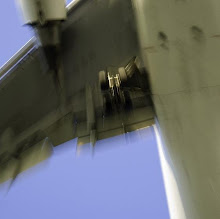It says pilots who fly over several time zones are in the most danger, saying this could be due to the effect of disturbances to the body's biological rhythms.

The health of more than 450 pilots in Iceland was studied, using the Icelandic Cancer Registry. The rates of skin cancer - malignant melanoma - were 10 times higher for all pilots, 15 times higher for those flying international routes and 25 times higher for pilots who flew over five or more time zones.
The study, published in Occupational and Environmental Medicine, also suggested higher rates of cancer in pilots who had more flying hours, which suggests other frequent flyers, including business travellers, may also be at risk.
Dr Vilhjalmur Rafnsson, of the department of preventative medicine at the University of Reykjavik, who led the research, said that the effect of long-haul flights on circadian rhythms needed further investigation.
Long-haul flights are known to interfere with the body's circadian rhythms - the daily biological cycle - which in turn affects levels of melatonin, the hormone responsible for sleep patterns.
Radiation
Other factors potentially involved in higher cancer rates are cosmic radiation, which occurs at greater levels at altitude, and lifestyle, including sunbathing.
The additional annual exposure to radiation, at 1 to 2 milliSieverts, was within accepted occupational levels.
Dr Rafnsson told BBC News Online: "By comparing the group of pilots with the Icelandic cancer register, we found this high rate of skin cancer. It is surprising that it is malignant melanoma that we found and that the rates are so high."
Melanoma accounts for about 10 percent of all skin cancers but causes 75-85 percent of skin cancer deaths. Excessive exposure to harmful sun rays can increase the risk of the disease.
Previous studies have shown higher levels of colon and brain cancer, while one carried out on British Airways pilots claimed a reduced risk of cancer.
Dr Rafnsson added that even frequent flyers would not fit into the top category of more than 5,000 hours flown by very experienced pilots.
But he said in the report: "The excess of malignant melanoma among those flying over five time zones suggests that the importance of disturbance of the circadian rhythm should be taken into consideration in future studies."
Frequent fliers
Farrol Kahn, director of the Aviation Health Institute, said: "One of the main factors would probably be from the radiation because pilots usually sit in the cockpit in short sleeves next to the windows.
"Previous studies have shown that pilots have more cases of leukaemia so it is no surprise to see that skin cancer rates are also high."
He did not believe circadian rhythms were likely to be a significant factor.
He said that he considered frequent fliers other than pilots were at risk from radiation. "In the long term, they should think about cutting down, particularly on long-haul flights," he added.
Source : BBC NEWS

0 comments:
Post a Comment